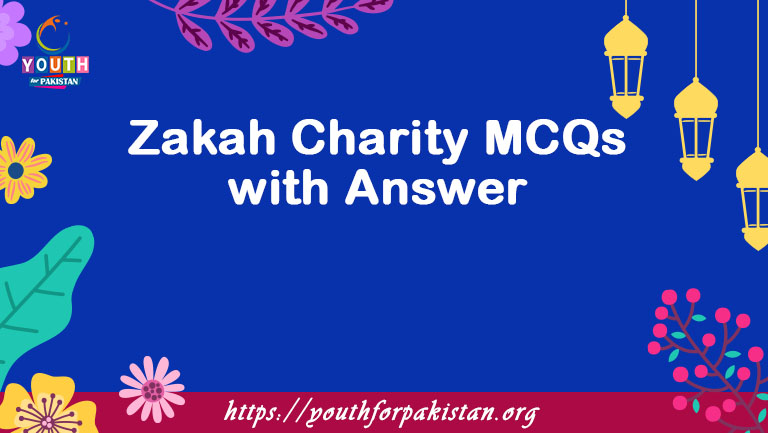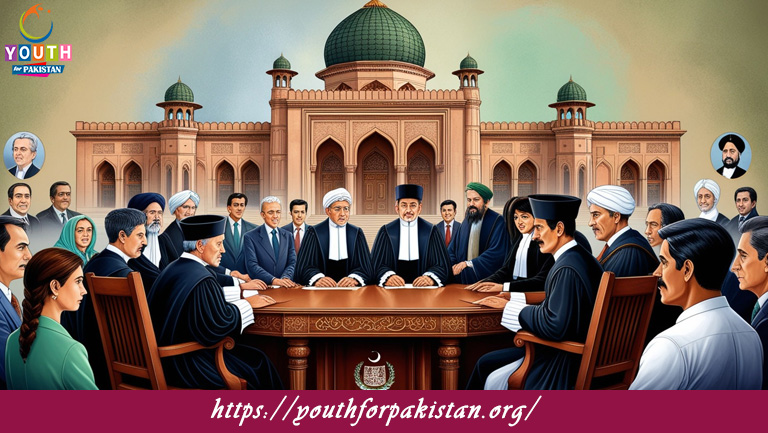The following are Belief in the Pillars of Islam: Zakah Charity MCQs with answers related to Islamic Studies. We have arranged the most important and repeated MCQs in all the competitive examinations. The students can clear their concepts for Belief in the Pillars of Islam: Zakah Charity MCQs online quiz by attempting these.
Belief in the Pillars of Islam: Zakah Charity Online MCQs with Answers
What is Zakah in Islam?
a) Fasting during Ramadan
b) Charity tax
c) Pilgrimage to Mecca
d) Daily prayer
How many Pillars of Islam are there in total?
a) Four
b) Five
c) Six
d) Seven
What is the minimum amount of wealth one must possess to be eligible to pay Zakah?
a) Any amount
b) 1% of income
c) Nisab (a specific threshold)
d) 10% of income
How often is Zakah typically paid by eligible Muslims?
a) Monthly
b) Annually
c) Weekly
d) Daily
What is the primary purpose of Zakah in Islam?
a) To support the Hajj pilgrimage
b) To provide financial support to the government
c) To purify wealth and help those in need
d) To fund religious education
What is the literal meaning of the word “Zakah” in Arabic?
a) Charity
b) Fasting
c) Pilgrimage
d) Prayer
Which of the following is NOT an eligible recipient of Zakah?
a) Needy individuals
b) Orphans
c) The wealthy
d) Debtors
What is the minimum percentage of one’s wealth that is typically paid as Zakah?
a) 1%
b) 2.5%
c) 5%
d) 10%
Which Islamic lunar month is often associated with the payment of Zakah?
a) Ramadan
b) Shawwal
c) Dhul-Hijjah
d) Rabi’ al-Awwal
What is the term for the portion of one’s wealth that is given as Zakah?
a) Fidya
b) Sadaqah
c) Nisab
d) Fitrah
What is the term for the process of purifying one’s wealth through the payment of Zakah?
a) Zakat al-Fitr
b) Zakat al-Mal
c) Zakat al-Nisab
d) Zakat al-Qurbani
How does Zakah benefit society beyond helping those in need?
a) It funds religious buildings
b) It supports the government
c) It promotes economic equality and social justice
d) It helps only the wealthy
In addition to wealth, what else can be subject to Zakah?
a) Real estate
b) Livestock
c) Vehicles
d) All of the above
How does Zakah differ from Sadaqah in Islam?
a) Zakah is obligatory, while Sadaqah is voluntary
b) Zakah is only given to the poor, while Sadaqah can be given to anyone
c) Zakah is given during Ramadan, while Sadaqah is given during Hajj
d) Zakah is given to religious leaders, while Sadaqah is given to family members
What is the term for the person who is eligible to receive Zakah?
a) Muezzin
b) Mufti
c) Mustahiq
d) Mufti
How is Zakah calculated on savings and investments?
a) Based on the total value of assets
b) Only on the interest earned
c) It is not applicable to savings and investments
d) Based on the number of years an asset has been held
Which Islamic authority often provides guidelines for the calculation and distribution of Zakah?
a) The United Nations
b) The World Bank
c) Islamic scholars and institutions
d) The local government
What is the term for the practice of delaying the payment of Zakah to a later date?
a) Qibla
b) Iqama
c) Taqwa
d) Qadha
Which Islamic holiday often involves the distribution of Zakah to the needy?
a) Eid al-Fitr
b) Eid al-Adha
c) Eid al-Ghadeer
d) Eid al-Mawlid
What is the term for the process of “giving voluntarily” in Islam?
a) Zakah
b) Sadaqah
c) Hajj
d) Salat
What is the primary intention behind paying Zakah in Islam?
a) To evade taxes
b) To seek a higher social status
c) To fulfill a religious obligation and please Allah
d) To gain political power
How does the payment of Zakah impact the giver?
a) It reduces one’s wealth
b) It increases one’s social status
c) It brings good luck
d) It has no impact on the giver
Which category of people is not eligible to receive Zakah?
a) The poor and needy
b) Debtors
c) Religious scholars
d) Travelers
What is the term for the person who collects and distributes Zakah on behalf of a community?
a) Zakah officer
b) Imam
c) Zakah agent
d) Mufti
In Islam, what is the significance of paying Zakah promptly?
a) It ensures financial prosperity
b) It fulfills the Hajj pilgrimage requirement
c) It purifies one’s wealth and helps those in need without delay
d) It allows the giver to receive tax benefits
What is the term for the annual amount of wealth on which Zakah is payable?
a) Zakah amount
b) Nisab
c) Sadaqah threshold
d) Zakah limit
In addition to helping those in need, what is another objective of Zakah in Islam?
a) To encourage saving money
b) To fund educational institutions
c) To promote social welfare and economic stability
d) To build luxurious mosques
Which of the following is NOT a form of wealth on which Zakah is obligatory?
a) Gold and silver
b) Livestock
c) Real estate
d) Automobiles
How is Zakah typically calculated on agricultural products?
a) Based on the total production
b) It is not applicable to agriculture
c) Based on the selling price
d) Based on the number of crops planted
What is the term for the practice of giving additional voluntary charity beyond Zakah?
a) Zakat al-Fitr
b) Zakat al-Mal
c) Sadaqah Jariyah
d) Witr
How does the payment of Zakah contribute to the social fabric of Muslim communities?
a) It creates division and conflict
b) It fosters unity and solidarity
c) It only benefits the wealthy
d) It has no impact on social cohesion
What is the term for the act of concealing one’s wealth to avoid paying Zakah?
a) Taqwa
b) Sadaqah
c) Riba
d) Tawriyah
What is the term for the practice of distributing Zakah locally within one’s community?
a) Zakat al-Mal
b) Zakat al-Fitr
c) Zakat al-Nisab
d) Zakat al-Tamlik
How is the recipient of Zakah determined in Islam?
a) By a lottery system
b) By a government agency
c) By the Zakah payer
d) By qualified Islamic authorities
What is the term for the practice of giving Zakah to one’s close relatives?
a) Tawfiq
b) Nafaqah
c) Silah al-Rahm
d) Aqiqah
What is the term for the annual practice of giving Zakah on behalf of each family member?
a) Zakat al-Mal
b) Zakat al-Fitr
c) Zakat al-Nisab
d) Zakat al-Tamlik
How does the concept of “purifying wealth” relate to Zakah in Islam?
a) It refers to cleaning money physically
b) It means removing impurities from money
c) It signifies cleansing wealth from selfishness and greed through charity
d) It has no relevance to Zakah
Which Islamic holiday often involves the distribution of Zakat al-Fitr to the needy?
a) Eid al-Fitr
b) Eid al-Adha
c) Eid al-Ghadeer
d) Eid al-Mawlid
In Islam, who is considered the “head of the household” responsible for paying Zakah al-Fitr?
a) The eldest family member
b) The wealthiest family member
c) The head of the family, typically the father
d) The religious leader of the community
What is the term for the act of giving Zakah privately to avoid showing off or seeking recognition?
a) Riya
b) Sadaqah
c) Zakah al-Nafilah
d) Sadaqah al-Tamlik
How does the payment of Zakah contribute to the reduction of poverty in society?
a) It doesn’t have any impact on poverty
b) It redistributes wealth to those in need
c) It only benefits the wealthy
d) It encourages people to save more
What is the term for the practice of giving Zakah to help people become financially self-sufficient?
a) Zakat al-Mal
b) Zakat al-Fitr
c) Zakat al-Nisab
d) Zakat al-Tamlik
How does the payment of Zakah contribute to economic stability in society?
a) It leads to inflation
b) It encourages excessive spending
c) It redistributes wealth and reduces income inequality
d) It has no impact on the economy
In which Islamic month is Zakat al-Fitr typically paid?
a) Ramadan
b) Shawwal
c) Dhul-Hijjah
d) Rabi’ al-Awwal
What is the term for the act of increasing one’s wealth through unjust means, which is prohibited in Islam?
a) Sadaqah
b) Riba
c) Taqwa
d) Ihram
What is the term for the practice of giving Zakah to help people become financially self-sufficient?
a) Zakat al-Mal
b) Zakat al-Fitr
c) Zakat al-Nisab
d) Zakat al-Tamlik
How does the payment of Zakah contribute to economic stability in society?
a) It leads to inflation
b) It encourages excessive spending
c) It redistributes wealth and reduces income inequality
d) It has no impact on the economy
In which Islamic month is Zakat al-Fitr typically paid?
a) Ramadan
b) Shawwal
c) Dhul-Hijjah
d) Rabi’ al-Awwal
What is the term for the act of increasing one’s wealth through unjust means, which is prohibited in Islam?
a) Sadaqah
b) Riba
c) Taqwa
d) Ihram
How is Zakah calculated on agricultural products?
a) Based on the total production
b) It is not applicable to agriculture
c) Based on the selling price
d) Based on the number of crops planted







